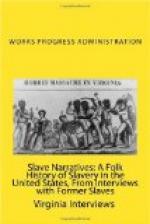Bert can just remember his grandparents.
He would feed pigs; pulled “pusley” out of the garden for them “and them pigs loved it mighty well”.
No money was paid for work. Bacon and “pone bread” baked in the yard in an oven that had legs and lid on top was the chief food and his favorite. The coals were put on top as well as under the oven. They drank sweet milk and butter milk, but no coffee; they also ate cabbage, squash, sweet and Irish potatoes, which were cooked with, skins on, greased, and put in the oven. “Possum” and coon hunts were big events, they would hunt all night. The possums were baked in the ovens and usually with sweet potatoes in their mouths. The little boys would fish, bringing home their fish to be scaled by rubbing them between their hands, rolled in meal and cooked in a big skillet. “We would eat these fish with pone corn bread and we sho’ had big eatins!”
Marse Stone had a big sugar camp with 300 trees. We would be waked up at sun-up by a big horn and called to get our buckets and go to the sugar camps and bring water from the maple trees. These trees had been tapped and elderwood spiles were placed in the taps where the water dripped to the wooden troughs below. We carried this water to the big poplar troughs which were about 10 feet long and 3 feet high. The water was then dipped out and placed in different kettles to boil until it became the desired thickness for “Tree Molasses”. Old Miss Polly would always take out enough of the water to boil down to make sugar cakes for us boys. We had great times at these “stirrin’ offs” which usually took place at night.
The neighbors would usually come and bring their slaves. We played Sheep-meat and other games. Sheep-meat was a game played with a yarn ball and when one of the players was hit by the ball that counted him out. One song we would always sing was “Who ting-a-long? Who ting-a-long? Who’s been here since I’ve been gone? A pretty girl with a josey on”.
There was no slave jail on the Stone place, and I never saw a slave sold or auctioned off. I was told that one of our slaves ran off and was gone for three years. Some white person wrote him to come home that he was free. He was making his own way in Ohio and stopped in Lexington, Kentucky for breakfast; while there he was asked to show his Pass papers which he did, but they were forged so he was arrested. Investigators soon found that his owner was Mr. Stone who did not wish to sell him and sent for him to come home. Uncle Ned’s own Tim said he “would go fetch him back” but instead he sold him to a southern slave trader. My old Mistus Meg taught me how to read from an old national spelling book, but I did not learn to write. We had no church, but the Bible was read to us on Sunday afternoons by some of the white folks. The first Church I remember was the Old Fork Baptist Church about four miles from Lancaster on the Lexington Pike. The first preacher I remember was Burdette




